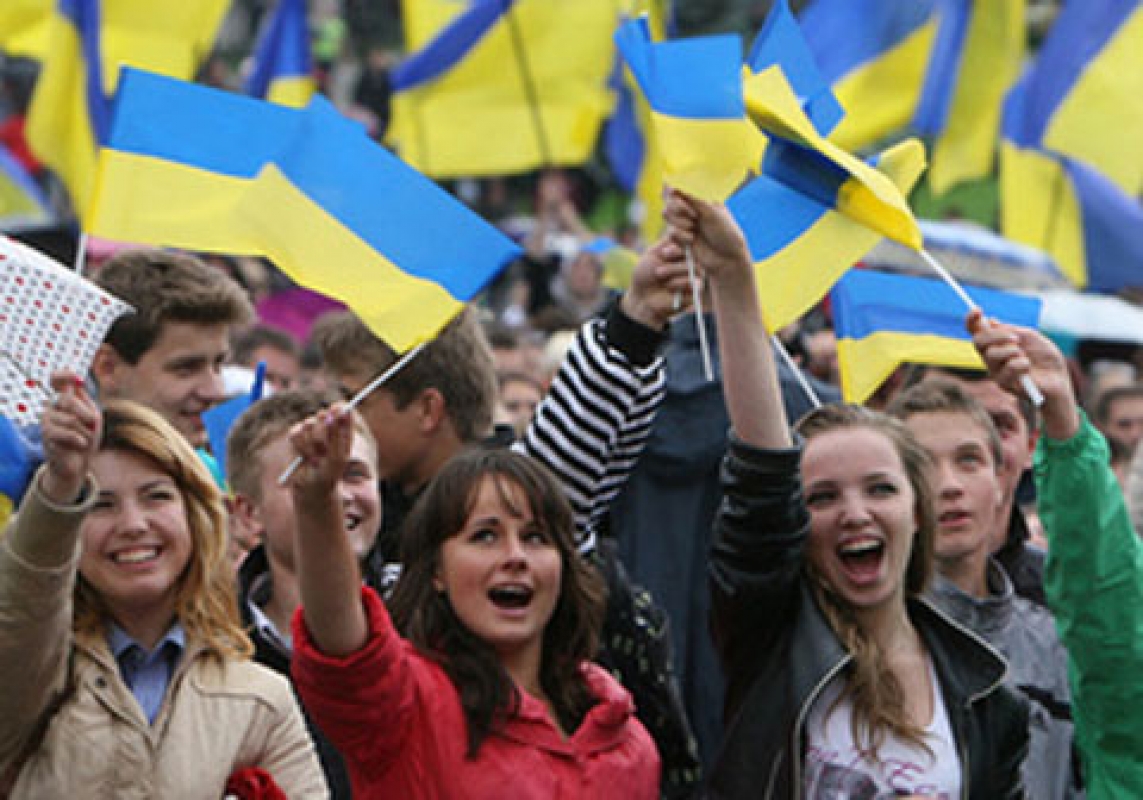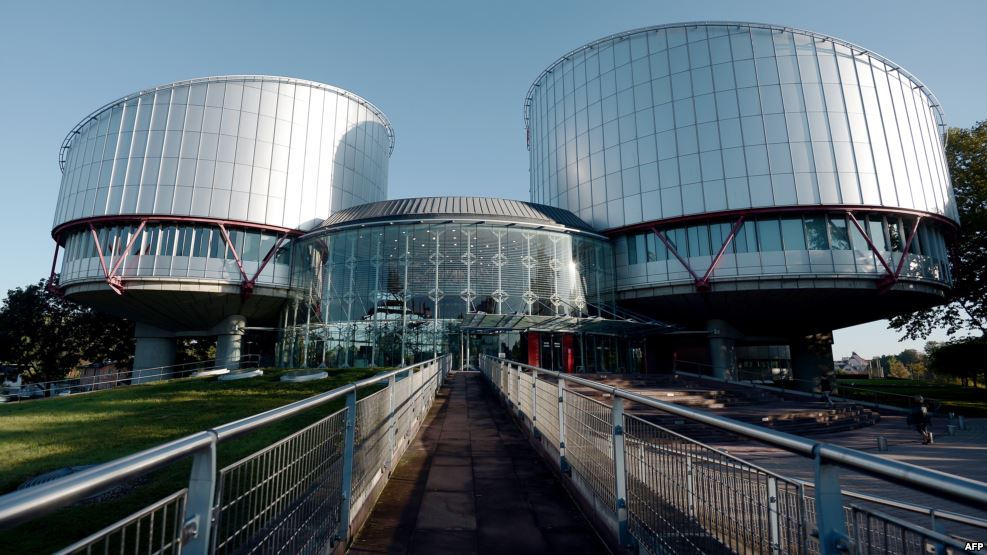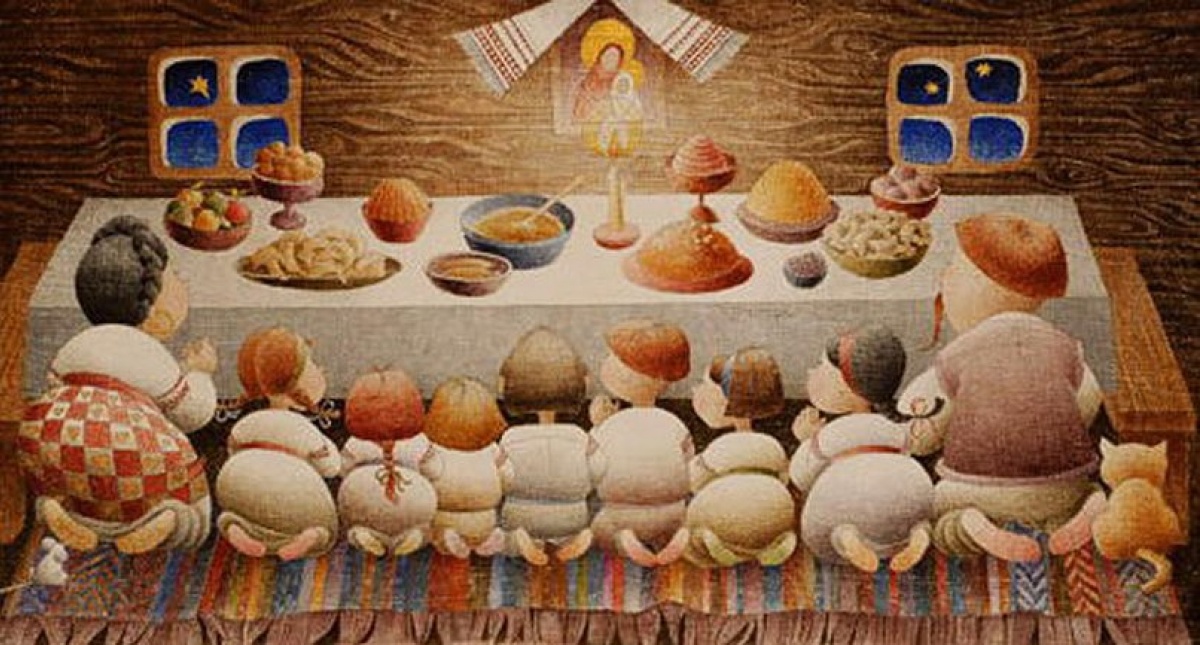The 28th anniversary of Ukrainian independence has only strengthened this already existing consensus on independence and unity — in 2019, the level of the support for a unified Ukraine among the citizens has become the highest in history. Moreover, while pessimism has been the common denominator for Ukrainians, in 2019 the majority of them started believing that their country is moving in the right direction for the first time ever.
During 28 years of independence, Ukraine never had problems with political identity
Amid significant regional discrepancies, Ukraine has always been strongly unified around its political unity and independence and only strengthened in this consensus in 2019.
Every year before Ukraine's Independence Day celebrated on 24 August, pollsters include an extremely important question in their annual social monitoring surveys. The question is, “If the referendum on the declaration of Independence of Ukraine was held today, how would you vote?”
Since 1991, the "voting" never dropped lower than 67% in support of independence. Moreover, this lowest approval rating - 67% was observed in 2011 shortly after the beginning of the presidency of Viktor Yanukovych, who was later ousted by the Revolution of Dignity in early 2014.
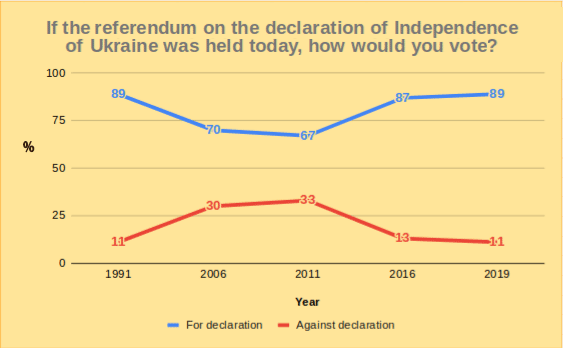
There was no single year in the history of independent Ukraine when the majority questioned the declaration of independence in 1991.
Also interesting is a fact mentioned by historian Yaroslav Hrytsak in a recent article: in 1993, the CIA in their report concluded that Ukraine was to face a civil war between its Ukrainian-speaking West and Russian-speaking East. That was just at the beginning of the severe economic crisis and mass strikes of coal miners in 1993.
However, the CIA prediction never materialized. Similar same predictions were often voiced throughout the entire period of Ukrainian independence, especially at times of the dire political crisis of 1994 and 2004, but the public support and consensus on Ukrainian independence steadily overcame all internal discussions.
The year of 2019 may become symbolic for Ukrainians because this year the public support of Ukrainian independence has risen back to the record level of 89%. The last time Ukrainians were so pro-independent was back in 1991, the year when the actual referendum was held. Russian propagandists should worry since the result of their work is exactly opposite to one of their goals.
The magic of Zelenskyy dispels eternal Ukrainian pessimism
Although in their aspirations Ukrainians support an independent and unified Ukraine, they always had little optimism about the future of the country. The crisis of 1993 dashed earlier hopes for prosperity. The Orange Revolution in 2004, the economic crisis of 2008, the Revolution of Dignity, and the war unleashed by Russia in 2014 contributed to the instability of the country, giving rise to disbelief among the citizens.
The problem, however, was deeper, since the former citizens of the Soviet Union had inherited distrust and skepticism towards authorities and politics in general. Any authorities couldn't do much when the whole nation didn't believe in itself and, subsequently, was not ready to invest energy in political life.
"For several years now, I and some of my colleagues have been saying that Ukraine has more important problems related not to identities, but to values," historian Yaroslav Hrytsak answers those who worry about a divided Ukraine. "Because the identities in Ukraine, amid all complexity, ensure the existence of Ukraine as a stable political community. However, the set of values that the majority of the Ukrainian population professes both in the West and in the East does not allow radical political and economic reforms in Ukraine. These are the so-called values of a closed society, which is dominated by feelings of fear and distrust, and the main desire of the residents is to find safety for themselves and their families.
Another unique peculiarity of the 2019 survey is that this year the results showed the majority of Ukrainians now believe that the country is on the right track for the first time ever. There were some positive upturns after two presidential elections of 2005 and 2010, yet both times the optimists were less numerous than the pessimists.
-
Read also: Poll results: Slight improvement amid national pessimism in Ukraine, positive local outlook (2017)
Paradoxically, albeit Zelenskyy didn't implement any major changes yet, the positive perception of Ukrainian politics at one moment increased from 18.1% in 2018 to the highest rate of 51% in the summer of 2019.
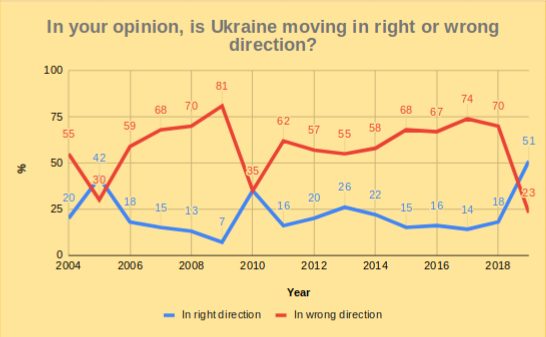
People’s positive self-perception breaking out from constant political pessimism may become an important source for future positive changes in ordinary people’s lives. As analytical website texty.org argues, such a positive perception alone has already led to the increase in the number of large purchases among Ukrainians and a higher self-perception of their economic conditions. Hopefully, this positive trend will not run out.
Nonetheless, together with Zelenskyy’s constant emphasis on the country’s unity, as in his Independence Day speech, the current optimism of Ukrainians is important for departing from the Soviet legacy of perceiving politics and the state as something alien and maleficent.
Speech of Volodymyr Zelenskyy on the 28th anniversary of Ukrainian Independence in which he stressed the country’s unity.
Read also:
- What Ukrainians think about Euromaidan five years on: survey
- Ukrainian millennials: apolitical, with family values, and a bit more pro-democracy than Western peers
- Referendums on controversial issues can undermine Ukraine’s unity – Tkachuk
- New poll results suggest where Russia and Ukraine are heading
- Who wants the USSR back in Ukraine?
- Do Ukrainians actually believe life was better in the Soviet Union than in France and Germany?
- The rise and decline of Donbas: how the region became “the heart of Soviet Union” and why it fell to Russian hybrid war
- Poll results: Slight improvement amid national pessimism in Ukraine, positive local outlook
- Three years into war, Ukrainians more positive toward aggressor than vice versa
- 68% of Ukrainians want pro-European reforms even without EU membership prospects

